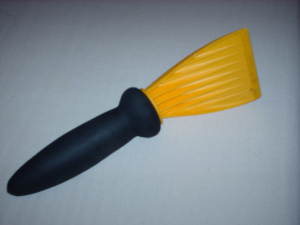Another Competitive Keyword Advertising Lawsuit Fails–Infogroup v. DatabaseLLC
The plaintiffs run several well-known databases, such as infoUSA and Salesgenie. The defendants are former employees of plaintiffs who split off and launched a competitive rival. The plaintiffs are upset that the defendants’ databases contain fake listings created by the plaintiffs, despite the marketing claim that the defendants’ databases are “verified.” The plaintiffs are also upset about what they perceive as various marketing overclaims that relate to the companies’ common history.
Defendants bought plaintiffs’ trademarks as AdWords. Like most recent cases, the trademark claims go nowhere (some cites omitted):
Infogroup argues that DatabaseUSA’s use of search engine ad placement services, triggered by Infogroup’s marks, is somehow infringing. The Court is unpersuaded. Although the use of such targeted advertising can be misused, it is generally understood that such tactics can be deployed consistently with the Lanham Act. See, CollegeSource, Inc. v. AcademyOne, Inc., 2015 WL 469041, at *11 (3d Cir. Feb. 5, 2015); 1–800–Contacts, Inc. v. Lens.com, Inc., 722 F.3d 1229, 1242–45 (10th Cir.2013); Network Automation, Inc. v. Advanced Sys. Concepts, Inc., 638 F.3d 1137, 1148–54 (9th Cir.2011); compare N. Am. Med. Corp. v. Axiom Worldwide, Inc., 522 F.3d 1211, 1222–23 (11th Cir.2008) (advertisers created likelihood of confusion by using competitors Web address and trademarks in their own advertisements). The advertisements at issue here, as displayed by Infogroup’s exhibits, do not use Infogroup’s marks in the advertisement itself, and each is either separated from the search results or plainly labeled as a sponsored advertisement. As the Tenth Circuit explained:
Perhaps in the abstract, one who searches for a particular business with a strong mark and sees an entry on the results page will naturally infer that the entry is for that business. But that inference is an unnatural one when the entry is clearly labeled as an advertisement and clearly identifies the source, which has a name quite different from the business being searched for.
Lens.com, 722 F.3d at 1245. And that could explain why Infogroup has presented no evidence to suggest that anyone has actually been confused by the advertisements, or is likely to be. Having considered “(1) the strength of the mark; (2) the evidence of actual confusion; (3) the type of goods and degree of care likely to be exercised by the purchaser; and (4) the labeling and appearance of the advertisements and the surrounding context on the screen displaying the results page,” the Court finds that Infogroup has not shown a likelihood of success under the Lanham Act based on DatabaseUSA’s search engine advertisements.
There are several other interesting nuggets in this opinion:

“Eiskratzer” by Stefan Flöper / Wikimedia Commons. Licensed under CC BY-SA 3.0 via Wikimedia Commons.
* the defendants’ representations that they had “95% Accurate, Triple–Verified Database” was puffery; or at minimum was not false because the inclusion of plaintiffs’ fake listings wasn’t inconsistent with the “verified” representations.
* the court says that a departed employee “is entitled to accurately describe his experience in the industry when marketing his company’s products and services,” so referencing a past employer’s trademark as part of the person’s employment history wasn’t a false association. Compare my discussion about the Robert Half case.
* Although the court sides with the defense consistently, it does tell the defendants that some of their claims may be misleading, so the court says “DatabaseUSA would be well advised to knock it off.” I can’t recall another time I’ve seen a judge use this informal colloquialism as an admonishment. However, I bet judges silently think this many, many times a day during courtroom proceedings.
Case citation: Infogroup, Inc. v. DatabaseLLC, 2015 WL 1499066 (D. Neb. Mar. 30, 2015)
___
Some Related Posts on Keyword Advertising
* Damages from Competitive Keyword Advertising Are “Vanishingly Small”
* More Defendants Win Keyword Advertising Lawsuits
* Another Keyword Advertising Lawsuit Fails Badly
* Duplicitous Competitive Keyword Advertising Lawsuits–Fareportal v. LBF (& Vice-Versa)
* Trademark Owners Just Can’t Win Keyword Advertising Cases–EarthCam v. OxBlue
* Florida Allows Competitive Keyword Advertising By Lawyers
* Another Keyword Advertising Lawsuit Unceremoniously Dismissed–Infostream v. Avid
* Another Keyword Advertising Lawsuit Fails–Allied Interstate v. Kimmel & Silverman
* More Evidence That Competitive Keyword Advertising Benefits Trademark Owners
* Suing Over Keyword Advertising Is A Bad Business Decision For Trademark Owners
* Florida Proposes to Ban Competitive Keyword Advertising by Lawyers
* More Confirmation That Google Has Won the AdWords Trademark Battles Worldwide
* Google’s Search Suggestions Don’t Violate Wisconsin Publicity Rights Law
* Amazon’s Merchandising of Its Search Results Doesn’t Violate Trademark Law
* Buying Keyword Ads on People’s Names Doesn’t Violate Their Publicity Rights
* With Its Australian Court Victory, Google Moves Closer to Legitimizing Keyword Advertising Globally
* Yet Another Ruling That Competitive Keyword Ad Lawsuits Are Stupid–Louisiana Pacific v. James Hardie
* Another Google AdWords Advertiser Defeats Trademark Infringement Lawsuit
* With Rosetta Stone Settlement, Google Gets Closer to Legitimizing Billions of AdWords Revenue

Pingback: Mixed Ruling in Competitive Keyword Advertising Case–Goldline v. Regal()